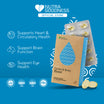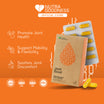What is Sustainable living?
Sustainable living refers to making choices that contribute to the health of the planet, society, and economy. It’s about using resources wisely, reducing waste, and supporting practices that protect the environment.
Think about it for a second: every time you decide to buy less plastic, conserve water, or reduce energy usage, you're helping protect the planet. It's not about perfection, but progress.
Think of one action you've already taken to live more sustainably, whether it’s recycling, using reusable bags, or eating locally grown food. Celebrate that choice! What other small changes can you make to improve your daily habits?
Why does sustainable living matter?
The world is facing significant challenges. Climate change, biodiversity loss, and resource depletion are growing concerns, and the actions we take now will determine the health of our planet in the future. Sustainable living is a solution. By adopting sustainable habits, we reduce our environmental carbon footprint, support local economies, and ensure a better quality of life for all.
EVERY SMALL CHANGE COUNTS
When millions of people make even small sustainable choices, it adds up to a huge positive impact.
What environmental issue worries you the most? Is it waste, energy use, water scarcity, or something else? Understanding what concerns you can help guide your sustainability efforts.
How Can You Embrace Sustainable Living?
Living sustainably can be simple, and it starts with small, everyday actions. Here are some practical ways to reduce your carbon footprint.
1. Waste Reduction: Reduce, Reuse, Recycle You’ve likely heard the saying, "Reduce, Reuse, Recycle." But what does it really mean in practice?
You’ve likely heard the saying, "Reduce, Reuse, Recycle." But what does it really mean in practice?
- Reduce: Cut down on unnecessary purchases. Opt for products with minimal packaging.
- Reuse: Repurpose items like glass jars, containers, plastic bags, paper bags or even old clothes.
- Recycle: Sort your recyclables to make sure they are disposed of properly. Compost organic waste to reduce landfill contributions.
Take a moment today to look around your home. Can you find one item you no longer need that can be repurposed or donated instead of thrown away?
2. Energy Conservation: Save Power, Save the Planet
- Switch to LED bulbs: These use less energy and last longer than traditional incandescent bulbs.
- Energy-efficient appliances: When buying new appliances, choose appliances that are energy-efficient (look for ENERGY STAR labels/ appliances that has 5 green ticks).
- Unplug unused electronics: Even when turned off, devices like TVs and chargers use electricity if plugged in.
P.S. Next time you leave a room, ask yourself: "Is there something I can turn off to save energy?" You’ll be surprised how many small changes you can make.
3. Sustainable Food Choices What we eat impacts the environment. You can make a difference by:
What we eat impacts the environment. You can make a difference by:
- Eating locally: Buy food from local farmers or markets to reduce the carbon footprint of transportation.
- Opting for plant-based meals: Reducing your meat consumption helps decrease greenhouse gas emissions from the livestock industry.
- Growing your own food: Even small container gardens can help cut down on store-bought produce.
What we eat impacts the environment. You can make a difference by:
-
Eating locally: Buy food from local farmers or markets to reduce the carbon footprint of transportation.
-
Opting for plant-based meals: Reducing your meat consumption helps decrease greenhouse gas emissions from the livestock industry.
-
Growing your own food: Even small container gardens can help cut down on store-bought produce.
P.S. This week, try reducing your plastic use by switching to reusable bags, bottles, or containers. How do you feel about making this small change, and what other items in your daily routine could you swap for more sustainable alternatives?
4. Water Conservation
- Water is one of our most precious resources. You can conserve water by:
- Fixing leaks: A small drip can waste a lot of water.
- Using water-efficient appliances: Install low-flow showerheads and faucets to reduce water use.
- Collecting rainwater: If you have a garden, consider setting up a rainwater collection system to water your plants. Or simply use a bucket to collect water for plant watering.
P.S. Try taking shorter showers or turning off the tap while brushing your teeth this week. Notice how much water you save!
5. Sustainable Transportation Transportation is a major source of pollution. Consider these eco-friendly alternatives:
Transportation is a major source of pollution. Consider these eco-friendly alternatives:
- Walk or bike: Short trips can easily be walked or cycled.
- Public transportation: Trains, buses, and carpooling help reduce the number of vehicles on the road.
- Electric vehicles (EVs): If you drive, consider switching to an electric or hybrid car.
P.S. Next time you need to go somewhere close, choose walking or biking instead of driving. Notice how it feels to move with less environmental impact.
6. Supporting Sustainable Companies
You can make a difference by supporting businesses that prioritize sustainability. Look for:
- Eco-friendly products: Opt for items made from sustainable materials like bamboo, recycled fabrics, or biodegradable products.
- Fair-trade goods: Choose products that support fair wages and ethical labor practices.
- Sustainable brands: Support companies that are transparent about their environmental impact and strive to make positive changes.
P.S. Next time you shop, try to find a sustainable brand or product to support. It’s a great way to vote with your dollars and encourage responsible businesses.
At Nutra Goodness, we believe that taking care of your health should also mean taking care of the planet. That’s why we use natural ingredients that support your well-being while embracing sustainable practices every step of the way. From solar-powered production to FSC-certified packaging, our products are thoughtfully crafted to nourish you—and protect the Earth for future generations.
The Role of Communities and Governments
Sustainable living isn’t just about individual action—it requires a collective effort. Communities and governments implement policies and practices that encourage sustainability, such as:
- Urban planning: Creating green spaces and energy-efficient buildings.
- Government incentives: Policies that encourage the use of renewable energy or reduce waste. Singapore government has started the Zero Waste Masterplan aiming to reduce 30% of carbon footprint by year 2030 (Towards Zero Waste).
- Public education: Spreading awareness about sustainability can inspire more people to get involved.
What sustainable actions would you like to see in your community or from your local government? Could you advocate for them or join local sustainability initiatives?
The Future of Sustainable Living
While the journey toward sustainability is ongoing, there’s hope on the horizon. Technological advancements, greater public awareness, and a shift toward sustainable practices are creating positive change. With your efforts, we can build a future where sustainable living is the norm, not the exception.
Your Next Step:
Pick one change from today’s article and commit to it. Whether it’s reducing waste, conserving energy, or supporting sustainable brands, your actions MATTER. Together, we can create a more sustainable and thriving world.
Conclusion
Sustainable living is a journey of small steps that add up to big change. By making conscious choices in the areas of energy use, waste, food, transportation, and more, you contribute to a healthier planet and future. What will your next step be? Start today, and know that every little effort counts in building a sustainable future for all.
P.S. Admin is trying these sustainable practices as well!




















![[Mix & Match] Nutra Goodness NutraAroma Pure Essential Oil 30ml - Peppermint/Lime/Ginger/Tea Tree](http://www.nutragoodness.com/cdn/shop/files/Nutra_Goodness_product_listing_nutra_aroma_mix_2c7cc02f-396c-461e-ad46-0c5f010e5a60.jpg?v=1737706140&width=104)


